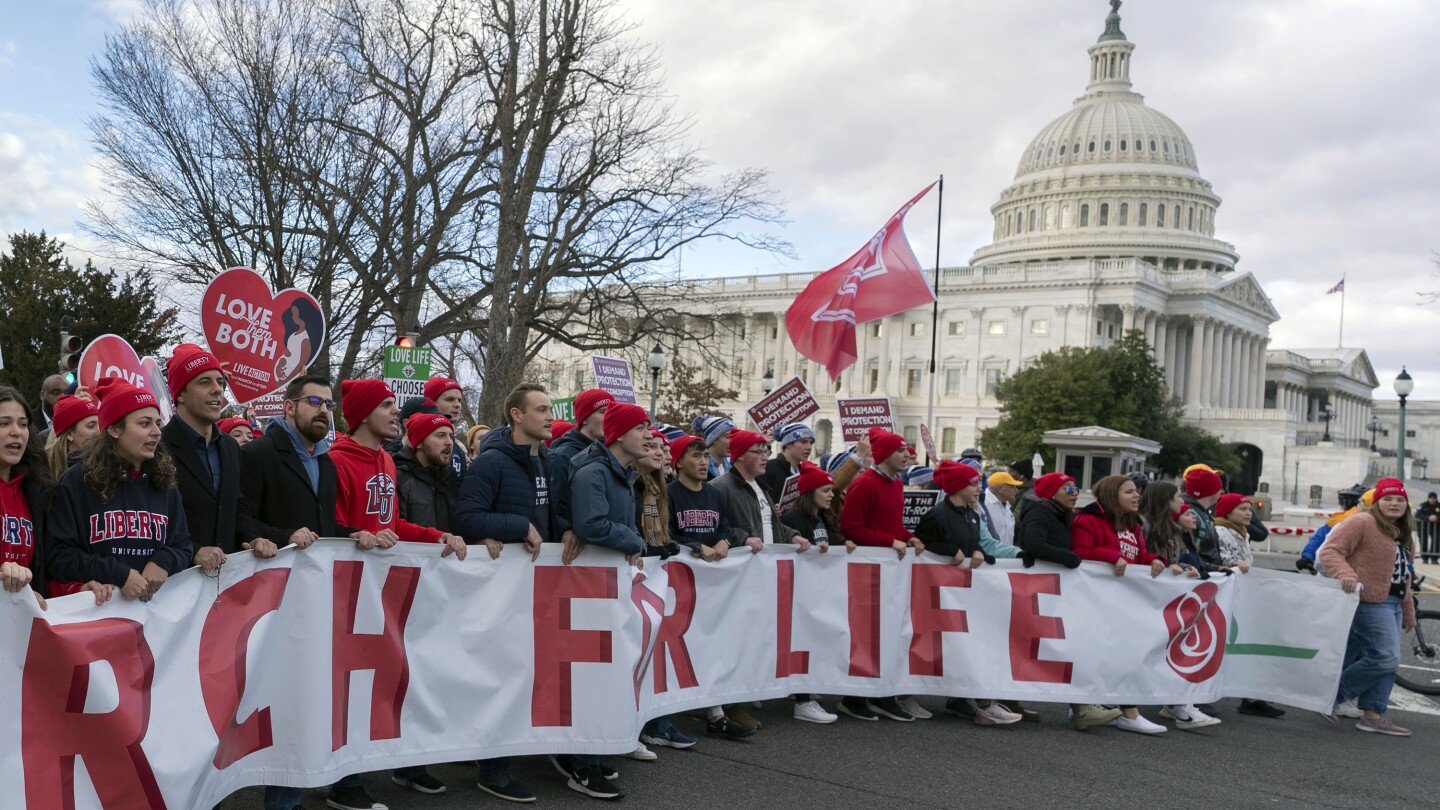WASHINGTON (AP) — More than a year after a generational victory for their movement, thousands of opponents of abortion rights rallied under falling snow on Friday at the annual March for Life, vowing to keep fighting until abortion is eliminated.
Months before a presidential election that could be heavily influenced by abortion politics, anti-abortion activists packed the National Mall carrying signs with messages such as “Life is precious” and “I am the pro-life generation.” After listening to speeches, the crowd, braving frigid temperatures, began marching toward the U.S. Capitol and the Supreme Court.
“Let’s be encouraged, let’s press on and hope that we can join together and make this great difference,” House Speaker Mike Johnson, R-La., told the crowd. “We can stand with every woman for every child, and we can truly build a culture that cherishes and protects life.”
Friday’s March for Life is the second such event since the June 2022 Supreme Court ruling that ended the federal protection for abortion rights enshrined in Roe v. Wade. Last year’s march was triumphant, with organizers relishing a state-by-state fight in legislatures around the country.
Speakers told the fired-up crowd that their fight is far from over and must continue until abortion becomes “unthinkable.” Appearing via video, Senate Republican Leader Mitch McConnell of Kentucky and other members of Congress thanked the crowd for their advocacy and urged them to keep pushing for anti-abortion policies.
“Roe is done, but we still live in a culture that knows not how to care for life,” said Benjamin Watson, a former NFL player who is now an anti-abortion advocate. “Roe is done, but the factors that drive women to seek abortions are ever apparent and ever increasing. Roe is done, but abortion is still legal and thriving in too much of America.”
Bishop Michael Burbidge, chair of the committee for pro-life activities for the U.S. Conference of Catholic Bishops, said the the Dobbs decision that overturned Roe v. Wade was “a victory but not a decisive one.”
“The key message this year is that our work is not done,” he said in an interview.
The crowd appeared smaller than in past years as heavy snow complicated travel plans. Young people built snowmen and had snowball fights behind the stage during the speeches.
“I almost didn’t come when I saw the forecast, but this is just incredible,” said Stephanie Simpson, a 42-year-old grocery store employee from Cleveland, who has attended the last four marches.
The anti-abortion fight rages on, with mixed results. The ruling in Dobbs v. Jackson Women’s Health Organization reverted abortion lawmaking back to the states, and 14 states are now enforcing bans on abortion throughout pregnancy. Two more have such bans on hold because of court rulings. And another two have bans that take effect when cardiac activity can be detected, about six weeks into pregnancy — often before women know they’re pregnant.
But abortion restrictions have also lost at the ballot box in Ohio, Kansas and Kentucky. And total bans have produced high-profile causes for abortion rights supporters to rally around. Kate Cox, a Texas mother of two, sought an abortion after learning the baby she was carrying had a fatal genetic condition. Her request for an exemption from Texas’ ban, one of the country’s strictest, was denied by the state Supreme Court, and she left Texas to seek an abortion elsewhere.
Movement organizers now expect abortion rights to be a major Democratic rallying cry in President Joe Biden’s reelection campaign.
“The pro-abortion forces, that’s one of the major things they’re going to run on,” said Susan Swift, president of Pro-Life Legal and a veteran anti-abortion activist. “That’s one of the only things that seems to animate their base.”
Biden campaign officials openly state that they plan to make Biden synonymous with the fight to preserve abortion rights.
Vice President Kamala Harris has led the charge on the issue for the White House. She will hold the first event in Wisconsin on Monday, which would have been the 51st anniversary of Roe v. Wade, the lawsuit that led to the landmark 1973 U.S. Supreme Court decision establishing a constitutional right to abortion.
___
Associated Press writer Alanna Durkin Richer reported from Boston. AP National Writer David Crary contributed to this report from New York.

